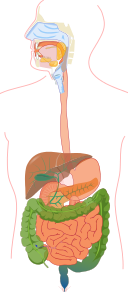
via Wikimedia Commons
A man in Maine was arrested and charged in August of 2016 with operating under the influence after police found him with a blood alcohol level nearly four times over the legal limit.
There was just one catch: he said that he hadn’t touched a drop of alcohol in months.
While this seems far-fetched, there is a medical explanation for being intoxicated without actually drinking alcohol. This medical explanation, called auto brewery syndrome, actually does affect a rare, small group of people throughout the country.
Unfortunately for this Maine man charged with DUI, the defense of auto brewery syndrome was unsuccessful. According to BDN Midcoast, the appellate court upheld the trial court’s denial of defendant’s witnesses supporting his argument of the defense, determining one of the witnesses was unqualified and the other was submitted too late. The Maine Supreme Judicial Court subsequently denied the appeal of the defendant.
According to National Center for Biotechnology Information (“NCBI”), auto brewery syndrome, also known as gut fermentation syndrome, occurs when yeast is trapped in the small intestine that then ferments sugars into ethanol, leading to drunkenness. The exact cause of the disease is still unknown due to its rarity and lack of research; however, it is often linked to a person’s digestion of yeast and the function of their liver.
Several cases have arisen throughout the United States claiming this medical defense. While most cases have been unsuccessful, some rare cases have succeeded. For instance, there has been reported a case where a woman became intoxicated from orange juice and another case where a woman’s heavy carb dinner caused herself to be intoxicated.
Since the amount of reported people with the disease remains very low, there have been an even lower number of DUI charges as a result of this disease. This is not a defense upon which DUI defense lawyers regularly use. Nonetheless, if you think you may suffer from this rare disorder, perhaps you should consider not driving until you are cleared by a medical professional.
About the Author: Steven Oberman has been licensed in Tennessee since 1980, and successfully defended over 2,500 DUI defendants. Among the many honors bestowed upon him, Steve served as Dean of the National College for DUI Defense, Inc. (NCDD) and currently serves as chair of the National Association of Criminal Defense Lawyers DUI Committee. Steve was the first lawyer in Tennessee to be Board Certified as a DUI Defense Specialist by the NCDD.
He is the author of DUI: The Crime & Consequences in Tennessee, updated annually since 1991 (Thomson-West), and co-author with Lawrence Taylor of the national treatise, Drunk Driving Defense, 8thedition (Wolters Kluwer/Aspen). Steve has served as an adjunct professor at the University of Tennessee Law School since 1993 and has received a number of prestigious awards for his faculty contributions. He is a popular international speaker, having spoken at legal seminars in 30 states, the District of Columbia and three foreign countries. In 2019, he was honored to be named a Fulbright Scholar and taught at the University of Latvia Law School as an Adjunct Professor for five months.
The author would like to thank University of Tennessee Law School student, Brooke Spivey, for her contributions to this article.
If you would like to contact the author, please visit his website.